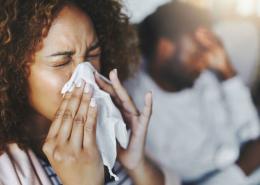Vaccines During Pregnancy

Women who get the vaccines recommended by the Centers for Disease Control and Prevention (CDC) during pregnancy can help protect themselves from some diseases—and they can give their babies some early protection as well. This happens because pregnant women who are vaccinated can pass along some of the antibodies (proteins that fight disease) they get from the vaccines to their babies. These antibodies can give the baby some protection against certain diseases during the first months of life—when the baby’s immune system is starting to develop and he or she is too young to get vaccinated.
Read on to learn more, and then talk with your healthcare provider about the vaccines that may be recommended for you.
What vaccines are recommended during my pregnancy?
Flu vaccine. The CDC and the American College of Obstetricians and Gynecologists (ACOG) recommend that women who are pregnant during flu season (October through May) get the flu vaccine. The CDC also recommends getting the shot by the end of October—before the flu season takes hold.
Women who are pregnant can have changes in their immune system and in their heart and lung functions—this can increase their risk for getting seriously ill from the flu. What’s more, getting the flu can result in serious problems for the unborn baby. These may include premature labor and delivery.
Getting a flu shot during flu season while pregnant may not only help protect the mother from getting the flu, it may also help protect her baby from complications from the flu for several months after he or she is born. Babies younger than 6 months old are too young to be vaccinated against the flu.
Tdap (tetanus/diphtheria/pertussis) vaccine. Pertussis (also called whooping cough) can be a serious disease for people of all ages. It’s especially serious for newborns because it can be life-threatening for them. In fact, up to 20 babies die from pertussis in the US each year, and about half of babies younger than 1 year old who get whooping cough need to go to the hospital for treatment.
The CDC recommends the Tdap vaccine during every pregnancy even if the Tdap vaccine was received in the past. Getting the Tdap vaccine helps the body make antibodies, which then gets passed to the baby before birth. That will give the baby some early protection from whooping cough. According to the CDC, the Tdap vaccine can be given any time during pregnancy but recommends receiving the vaccine between the 27th and 36th weeks of each pregnancy. Getting the vaccine earlier in this period will give the baby the most antibodies.
If pregnant women have never received the Tdap shot before, it is recommended that they receive it after giving birth. This can help protect the mother and make it less likely for her to pass pertussis to the baby.
What other vaccines are recommended during pregnancy?
There are situations where additional vaccines may be needed. For example, if you’re pregnant:
- And are planning to travel outside of the US, talk with your healthcare provider at least 4 to 6 weeks before traveling to find out if any special vaccines may be required.
- And have certain medical conditions (for example, hepatitis B), ask your healthcare provider if he or she recommends that you be vaccinated for them.
- And work in a lab where you may exposed to certain diseases, talk with your healthcare provider about additional vaccines you may need.
Are there situations when vaccines are NOT recommended during pregnancy?
Talk with your healthcare provider about what vaccinations are right for you.
Whether you are pregnant or not, you should not receive any vaccine, including the flu or Tdap vaccine, if you are allergic to the vaccine or to any of the ingredients in the vaccine. If you have a weakened immune system due to illness, cancer, or other medical conditions, talk with your healthcare provider before receiving any vaccines. In addition, there are some vaccines that are not recommended during pregnancy. These include live vaccines such as measles/mumps/rubella (MMR) and chicken pox.
Can I get vaccinated if I’m breastfeeding?
Getting vaccinated after giving birth can help prevent you from getting certain illnesses. If you breastfeed, you may pass some antibodies to your baby through your breastmilk. Be sure to ask your healthcare provider any questions you may have about vaccinations and breastfeeding.
Do family and caregivers need to be vaccinated?
Family members and caregivers who come into contact with your baby can pass an illness to him or her. The CDC deems it important that they are also up to date with their routine vaccines. These may include the Tdap vaccine, and during flu season, the flu vaccine.
If you’re pregnant or are thinking about getting pregnant, talk with your healthcare provider to find out what vaccinations are recommended for you and when you should receive them.
[1][2][3][4][5][6][7][8][9][10][11][12][13]
References
- 1. Centers for Disease Control and Prevention. Maternal Vaccines: Part of a Healthy Pregnancy. Accessed September 5, 2018.
- 2. The American College of Obstetricians and Gynecologists. The Flu Vaccine and Pregnancy FAQ. Accessed November 27, 2018.
- 3. Vaccines.gov. Vaccines for Pregnant Women. Accessed June 29, 2018.
- 4. Cleveland Clinic. Is Your Newborn Baby’s Immune System Strong Enough? Accessed September 5, 2018.
- 5. Centers for Disease Control and Prevention. Pregnancy and Vaccination. Accessed September 6, 2019.
- 6. Centers for Disease Control and Prevention. Guidelines for Vaccinating Pregnant Women. Accessed September 26, 2018.
- 7. Centers for Disease Control and Prevention. Why Maternal Vaccines are Important. Accessed September 6, 2018.
- 8. Centers for Disease Control and Prevention. Vaccinating Pregnant Patients. Accessed September 6, 2019.
- 9. Centers for Disease Control and Prevention. Maternal Vaccines: Part of a Healthy Pregnancy (Other Vaccines). Accessed September 6, 2018.
- 10. Centers for Disease Control and Prevention. Who Should NOT Get Vaccinated with These Vaccines? Accessed September 6, 2018.
- 11. Vaccines.gov. Vaccines Protect Your Community. Accessed August 2, 2018.
- 12. Centers for Disease Control and Prevention. Guidelines for Vaccinating Pregnant Women. Accessed September 10, 2018.
- 13. Centers for Disease Control and Prevention. Create a Circle of Prevention Around Babies. Accessed September 10, 2018.





